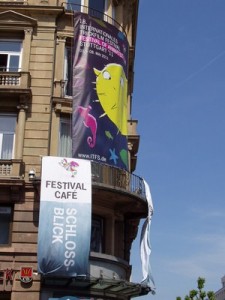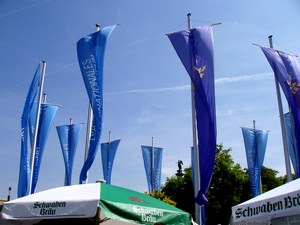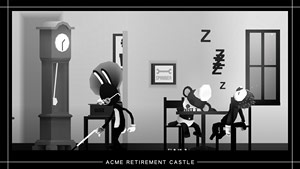The 18th Stuttgart Festival of Animated Film – Overview
 With my first steps into the city streets, it became quickly obvious that the Internationales Trickfilm Festival Stuttgart (ITFS) is a dominating presence in the town for its six-day run. Billboards, banners and bus-stop ads emblazoned with the disoriented pufferfish heralding the animation festival’s eighteenth edition were everywhere, the Schlossplatz brimming with enthusiasts transfixed by a specially erected, giant LED screen which seemed to constantly stream animation of all types. There was no ambiguity as to whether or not I was in the right place.
With my first steps into the city streets, it became quickly obvious that the Internationales Trickfilm Festival Stuttgart (ITFS) is a dominating presence in the town for its six-day run. Billboards, banners and bus-stop ads emblazoned with the disoriented pufferfish heralding the animation festival’s eighteenth edition were everywhere, the Schlossplatz brimming with enthusiasts transfixed by a specially erected, giant LED screen which seemed to constantly stream animation of all types. There was no ambiguity as to whether or not I was in the right place.
Accompanied by weather so perfect as to almost arouse suspicion, the festival seems regarded by locals less as a week-long magnet for industry representatives and tourists than an excuse to cultivate an air of conviviality and celebration; Food, drink, sunshine, cartoons – how can you not be in a good mood? Even beyond the festival site itself, the town’s abundance of compelling architecture, culture, parks, plazas and eateries make for an ideal long-weekend away.
With my own film tucked into one of the late night Panorama screenings, my primary motivation for being here was to leap on the provided accreditation and experience the festival as an observer – ITFS had been on my list of crucial festivals to attend for a while, spoken highly of by plenty and, as I discovered, with good reason. With so many events, workshops and networking opportunities on offer, the notion of any time spent here being wasted was farcical at best.
In an ideal world, of course, there’d be no picking and choosing what to attend when several intriguing screenings or events clash, but such is the inevitability of any festival. The positive side being that the standard was so consistently high across the board that, wherever I was, there was no nagging impulse that my time would be better spent elsewhere.

Midst the panoply of screenings focused on contemporary animation were numerous explorations into the cultural history of the medium. Friday evening saw a special presentation of Lotte Reiniger’s 1926 silent piece “The Adventures of Prince Achmed”, accompanied by a live performance of a new score by Renaud Garcia-Fons, while the Animated Africa presentations comprehensively delved into the development and cross-pollination of African and Egyptian animation from the early 1930s.
Studio presentations included Industrial Light and Magic VFX Supervisor Tim Alexander and CG Supervisor Patrick Cohen discussing the coming-together of “Rango”, their first animation-only feature; As well as the UK’s Studio AKA wherein Creative Director Philip Hunt talked through the process of several of the studio’s standout success stories as well as refreshingly candid tales of pitched projects that died on the vine despite their impressiveness at the conceptual stage, closing with their latest short “A Morning Stroll” (Dir. Grant Orchard) that takes visually-ingenious steps into considerably darker territory than they’ve conceivably been known for in the past.
Nearby the FMX Conference was on until Friday, with its own set of events, lectures and exhibits to complement those of ITFS. Understandably the speakers that presented to the most packed houses were those of heavy-hitting companies such as Electronic Arts, Dreamworks, Pixar et al. The obvious appeal of gleaning insight into their respective production processes served as a welcome demystification of the magic they so notoriously achieve; Seeing excerpts from feature films of an intimidating scale broken down into phases and pipelines – the trial and error of getting a shot to flow, punching up dialogue, set pieces and so on – hammered home just how man-made and feasible it all can be with the right amount of time, resources and talent.
 Recruitment hubs for various studios were manned by wearied representatives whose job mainly seemed to consist of grounding the reams of aspiring Lasseters, Lucases and Lords with the less-enticing reality of which technical-end roles were in demand. While the School Campus tradeshow was largely impressive in terms of the showreels and alumni output on display, the student experience itself was nearly impossible to gauge as pretty much every institution’s representative seemed either socially terrified or bored to be there. A far more impressively executed selection of academic showcases could be found back at the ITFS end, with promising work exhibited from a variety of institutions such as the National Film & Television School, Stuttgart’s local Media University, the Bristol School of Animation, Harvard University’s animation contingent and, on the closing Sunday, several presentations by the Baden-Wuerttemberg Film Academy, wherein a number of promising students demonstrated their entrepreneurial inclinations toward the future application of their student projects.
Recruitment hubs for various studios were manned by wearied representatives whose job mainly seemed to consist of grounding the reams of aspiring Lasseters, Lucases and Lords with the less-enticing reality of which technical-end roles were in demand. While the School Campus tradeshow was largely impressive in terms of the showreels and alumni output on display, the student experience itself was nearly impossible to gauge as pretty much every institution’s representative seemed either socially terrified or bored to be there. A far more impressively executed selection of academic showcases could be found back at the ITFS end, with promising work exhibited from a variety of institutions such as the National Film & Television School, Stuttgart’s local Media University, the Bristol School of Animation, Harvard University’s animation contingent and, on the closing Sunday, several presentations by the Baden-Wuerttemberg Film Academy, wherein a number of promising students demonstrated their entrepreneurial inclinations toward the future application of their student projects.
Of all the events and showcases on offer, the purposeful focus of the festival was its International Competition, a staple of each evening and a huge crowd draw. Showing up half an hour beforehand would already see one faced with a throng of enthusiastic festival patrons filling the cinema lobby, eagerly waiting to be let past the rope divider as though at a high-profile gala event. For the most part each screening was able to lend justification to all the commotion – the selection committee clearly have a discerning eye for quality, which is welcome indeed given the seemingly random nature of many festivals on the circuit. These evenings reassured us that there is a legitimately thriving wealth of talent out there, and even on the independent/auteur end of the spectrum, the bar at present is raised very high indeed. Spanning drama laced with visual inventiveness – such as “Les Bessones del Carrer de Ponent” (Marc Riba, Anna Solanas), “Tussilago” (Jonas Odell) and “A Lost and Found Box of Human Sensation” (Martin Wallner, Stefan Leuchtenberg); Abstract, experimental works like Ondrej Svadlena’s gleefully grotesque yet strangely beauteous “MRDRCHAIN” and festival favourite “Big Bang Big Boom” (Blu); And of course the happily received assortment of films that were just out-and-out hilarious, led by “Babioles” (Matray), “Hon and Han” (Magnus Carlsson) and Joost Lieuwma’s brilliantly simple premise of “Things You’d Better Not Mix Up”. The temptation is to simply continue to list all the satisfying and inspiring films on offer, across not just the competitions but also the panoramas, children’s sections, retrospectives and regional screenings, but that would see me essentially reprinting a fairly hefty percentage of the festival programme.
 Supplementing the nightly competition screenings were daily filmmaker talks, in which the previous evening’s competitors were invited to elaborate on their respective backgrounds in the industry and how their films came together. For those intrigued by the creative process these discussions were of significant value, on some days breaking away from a regimented panel Q&A to comparatively informal – though enthusiastic – debates on how the films were (and could conceivably be) interpreted.
Supplementing the nightly competition screenings were daily filmmaker talks, in which the previous evening’s competitors were invited to elaborate on their respective backgrounds in the industry and how their films came together. For those intrigued by the creative process these discussions were of significant value, on some days breaking away from a regimented panel Q&A to comparatively informal – though enthusiastic – debates on how the films were (and could conceivably be) interpreted.
The award ceremony itself was the only part of the festival that came off as somewhat disorganised. Presented entirely in German (it was declared at one point that we had all been offered headphones relaying English translations upon entry; we weren’t) a great deal of the audience was subjected to long speeches reflecting on the week and the decisions made, all of them apparently quite witty and articulate given the response of the audience members that could understand what was being said. The nominated filmmakers – having been ushered in last to exclusive seats that, it turned out, hadn’t been reserved and were all filled – had to scramble for any place to sit, some settling for the aisle floors. There was also the glitchy on-screen presentation’s habit of skipping ahead and giving the names of the winning films away several minutes before the official announcements. Those conspiring forces aside, the overall atmosphere afterward was one of satisfaction, and the aforementioned winners were generally considered to be well deserving, especially the top three*. Andrew Ruhemann’s adaptation of Shaun Tan’s “The Lost Thing”, a film even the most stone-hearted would struggle to not enjoy, picked up the Audience Award; Alois de Leo’s “The Boy Who Wanted to be A Lion” – a harsh yet sensitively-executed student short destined to perform well – received the Lotte Reiniger Promotion Award. Taking the top spot with the Grand Prix award was David o’Reilly’s low-poly nightmare vision “The External World” for which his ‘twin’ accepted via video speech that made clear the stock he holds in the value of humour, something especially important when it comes to the accessibility of progressive animated film.
The closing party had a somewhat bittersweet air to it, as all things ‘closing’ tend to by nature. I had met some inspiring and humbling practitioners of a medium I’m still cutting my teeth on, and getting to know them and the paths that had led them to where they are, no matter how green or how seasoned, was probably the best part of the festival experience. Possibly if I’d attended in a competitive capacity or with a few decades of industry experience behind me, the lily wouldn’t be quite as gilded – but I doubt it. The sense of dis-ingenuousness and barbed cattiness that hampers so many festivals of this type was completely nonexistent here; Stuttgart seems to have gotten it right.
The full list of prizewinners is available below:
 Several prizes were awarded in the International Competition: A German film, “The External World” by David O’Reilly, won the Grand Prix and its cash prize of 15,000 Euros donated by the State of Baden-Württemberg and the city of Stuttgart. The film, with a bizarre humour which tests the limits of political correctness, is both satirical and profound. The Lotte Reiniger Sponsorship Award for Animated Film, sponsored by the MFG Filmförderung Baden-Württemberg (10,000 Euros) went to “The Boy who wanted to be a Lion” by Alois di Leo, in which a visit to the zoo changes the life of a young boy completely. The Lena Weiss Animation Award for Humanity, sponsored by the Meckatzer Löwenbräu (5,000 Euros), was awarded for the first time this year. The winning film is “Der Wechselbalg” (“Changeling”) directed by Maria Steinmetz is particularly concerned with motherly love. The SWR Audience Award with a cash prize worth 6,000 Euros went to “The Lost Thing” by Shaun Tan and Andrew Ruhemann. The special award Music for Animation was presented to Corey A. Jackson for the film music for “A Cow who wanted to be a Hamburger” by Bill Plympton (interview with Bill available here), a veteran of the Festival.
Several prizes were awarded in the International Competition: A German film, “The External World” by David O’Reilly, won the Grand Prix and its cash prize of 15,000 Euros donated by the State of Baden-Württemberg and the city of Stuttgart. The film, with a bizarre humour which tests the limits of political correctness, is both satirical and profound. The Lotte Reiniger Sponsorship Award for Animated Film, sponsored by the MFG Filmförderung Baden-Württemberg (10,000 Euros) went to “The Boy who wanted to be a Lion” by Alois di Leo, in which a visit to the zoo changes the life of a young boy completely. The Lena Weiss Animation Award for Humanity, sponsored by the Meckatzer Löwenbräu (5,000 Euros), was awarded for the first time this year. The winning film is “Der Wechselbalg” (“Changeling”) directed by Maria Steinmetz is particularly concerned with motherly love. The SWR Audience Award with a cash prize worth 6,000 Euros went to “The Lost Thing” by Shaun Tan and Andrew Ruhemann. The special award Music for Animation was presented to Corey A. Jackson for the film music for “A Cow who wanted to be a Hamburger” by Bill Plympton (interview with Bill available here), a veteran of the Festival.
The award for the best voice actor in an animated feature film, either the original voice or the German voice-over, with a cash prize of 2,500 Euros was presented for the third time. The winner is Christoph Maria Herbst for his performance as the Gallic cockerel Charles in the German animated film “Animals United”. The Young Animation competition was won by Kirsten Lepore from the USA for her film “Bottle” , a wonderful love story between a heap of sand and one of snow.
Once again, the makers of a German animated film took home the Trickstar for the best children’s animated film in the competition Tricks for Kids. The child jury, with its eight members, presented the award sponsored by Nickelodeon with a cash prize of 4,000 Euros to Matthias Bruhn for his unusual children’s film “Duck, death and the Tulip”.
The musical romance “Chico y Rita” set in Havana in the 1940’s by Javier Maricsal, Fernando Trueba and Tono Errando won the award for the best animated feature film in the AniMovie category. The cash prize of 2,500 Euros was donated by SUPER RTL.
The film “Muto” by Blu, award-winner at the ITFS 2009, had by far the most loyal fan base for the Trickparade, the online Audience award. The film received the most votes and was awarded the prize of 1,000 Euros donated by the Kulturgemeinschaft.
The German Screenplay Award was presented to Konradin Kunze on Wednesday evening for his screenplay for “The Last World” . The cash prize of 2,500 Euros was donated by Telepol GmbH.
Yesterday, Saturday May 7th. France’s Pleix won the main prize in the Animated Com Award. The film “Death Penalty” produced by Warm&Fuzzy for Amnesty International is a plea for the abolition of the death sentence, realised in a passionate and technically perfect fashion (cash prize of 10,000 Euros donated by the Fraunhofer Institut IPA, Mackevision and Kolbenschmidt Pierburg).

